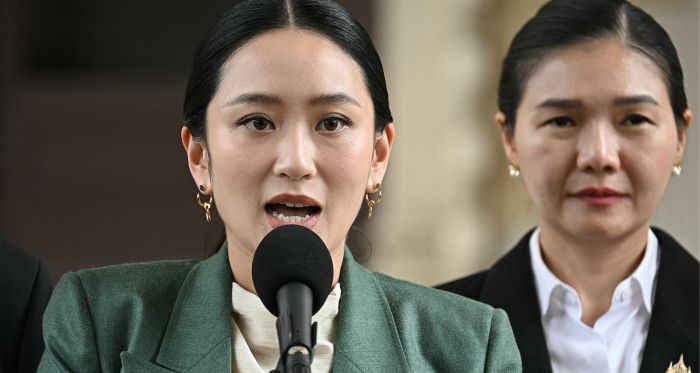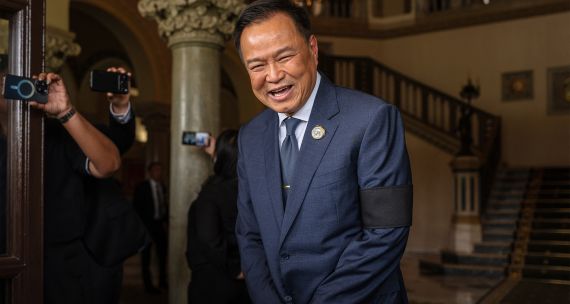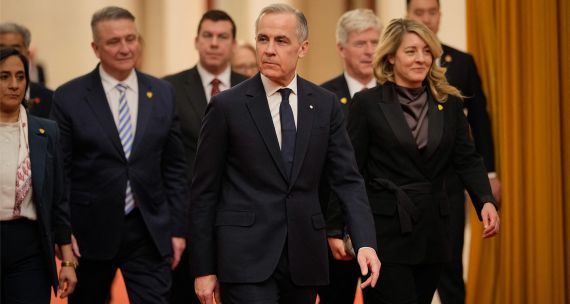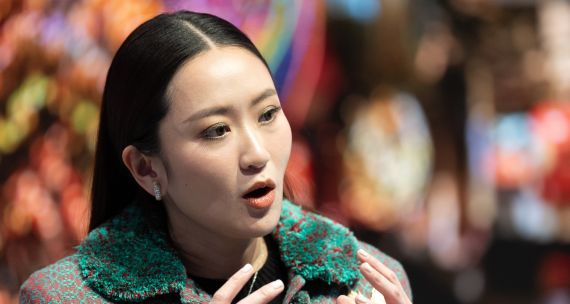La relation entre le Cambodge et la Thaïlande s’est détériorée depuis le déclenchement, le 28 mai, d’un conflit frontalier ayant entraîné la mort d’un soldat cambodgien. Ce conflit, qui n’est pas le premier entre les deux pays, découle d’une querelle de longue date au sujet des lignes de démarcation, remontant aux négociations du début du 20e siècle entre la Thaïlande (alors le Siam) et les autorités coloniales françaises présentes dans le territoire qui est aujourd’hui le Cambodge. Depuis plusieurs semaines, les deux pays sont engagés dans une série d’actions de représailles, fermant les frontières terrestres et renforçant la présence de leurs troupes. En outre, le 23 juin, le gouvernement thaïlandais a interdit aux touristes, qu’ils soient thaïlandais ou étrangers, d’entrer au Cambodge depuis la Thaïlande. Le gouvernement cambodgien, quant à lui, a interdit les importations de pétrole, de gaz, de fruits et de légumes thaïlandais, ainsi que la diffusion de films thaïlandais dans les cinémas.
Un autre événement en rapport avec celui-ci, plus extraordinaire encore, et qui menace à présent la stabilité politique de la Thaïlande, concerne la fuite d’un appel téléphonique du 15 juin, entre la première ministre thaïlandaise Paetongtarn Shinawatra et l’ancien premier ministre cambodgien Hun Sen, largement suspecté d’avoir une influence importante sur le gouvernement de son fils Hun Manet. Paetongtarn a affirmé que l’appel ne visait qu’à essayer de désamorcer le conflit. Cependant, le ton de la conversation rapporte une histoire complètement différente : lors de son échange avec Hun Sen, elle a mentionné qu’un général militaire thaïlandais impliqué dans le conflit appartenait au « côté opposé » du fossé politique thaïlandais, puis, ayant respectueusement fait référence à Hun Sen comme à un « oncle », elle lui a dit qu’elle « s’occuperait » de ses préoccupations.
Cette révélation a entraîné un torrent d’appels et de pétitions demandant la démission de Paetongtarn, certains exigeant de nouvelles élections, et les « chemises jaunes », les manifestants anti-Shinawatra, sont redescendus dans la rue pour la première fois depuis plus d’une décennie. Ces royalistes, qui portent du jaune pour afficher leur loyauté envers la monarchie, ont contribué à déstabiliser la Thaïlande et à ouvrir la voie à des interventions militaires à deux reprises au cours des 20 dernières années. Le coup d’État de 2006 a chassé Thaksin Shinawatra, le père de Paetongtarn, du bureau du premier ministre, et celui de 2014 en a renvoyé sa tante. De l’avis des opposants à la dynastie Shinawatra, les actions de Paetongtarn, perçues comme anti-nationales, sont monnaie courante dans la famille. L’une des étincelles ayant déclenché les manifestations anti-Shinawatra en 2006 fut la vente, par Thaksin, d’actifs d’une entreprise de télécommunications basée en Thaïlande à la firme Temasek Holdings de Singapour.
Le 1er juillet, la Cour constitutionnelle a accepté l’une des pétitions, suspendant Paetongtarn de ses fonctions pour toute la durée d’un procès qui va maintenant avoir lieu. Paetongtarn est jugée pour manque d’intégrité et violation des normes éthiques lors de son appel téléphonique avec Hun Sen. Le procès, qui va déterminer si Paetongtarn sera privée de l’exercice de ses fonctions, devrait durer un à deux mois avant d’arriver à une conclusion. Dans l’intervalle, elle restera dans le cabinet en tant que ministre de la Culture, un poste auquel elle avait été stratégiquement assignée lors d’un remaniement ministériel peu de temps avant que la Cour constitutionnelle ne prenne sa décision. Le vice-premier ministre Suriya Jungrungruangkit, collègue de Paetongtarn dans le parti Pheu Thai, fera office de premier ministre intérimaire.
Le Pheu Thai dirige un gouvernement de coalition fragile, formé en 2023 à des fins de « grande réconciliation » entre le camp Shinawatra dirigé par Thaksin et les conservateurs royalistes, afin de garder le parti Move Forward, progressiste et aujourd’hui interdit, en dehors du gouvernement. Cette coalition est aujourd’hui extrêmement compromise, en particulier après qu’un partenaire important de la coalition, Bhumjaithai, s’est retiré du gouvernement le 18 juin, réduisant ainsi le soutien parlementaire de Paetongtarn à 254 membres de la chambre basse de Thaïlande sur 495. Bhumjaithai a juré d’essayer de renverser le gouvernement par un vote de censure lorsque le Parlement thaïlandais se réunira à nouveau cette semaine. Cela ne pourra toutefois pas avoir lieu en raison de la suspension de la première ministre.
Étant donné l’accent placé sur la participation de l’Asie du Sud-Est dans la stratégie pour l’Indo-Pacifique ainsi que les récentes missions commerciales et les discussions actuelles portant sur un accord de libre-échange avec l’Association des Nations de l’Asie du Sud-Est (ANASE), il est important de mieux comprendre la dynamique entre le Cambodge et la Thaïlande et ses implications pour la stabilité politique en Thaïlande.
Les grands acteurs de la politique intérieure de l’ANASE
De manière peu surprenante, le fait que Paetongtarn semble se ranger aux côtés d’un dirigeant étranger contre les intérêts de sa propre nation a été abondamment critiqué, à juste titre. Cependant, son appel téléphonique avec Hun Sen a également révélé un élément moins exploré de la politique de l’Asie du Sud-Est : l’amitié et la déférence que Paetongtarn a témoignées à Hun Sen sont un exemple de la manière selon laquelle, à un niveau personnel, un grand nombre de dirigeants d’Asie du Sud-Est ne sont pas en aussi mauvais termes que ces querelles de frontières et autres conflits occasionnels pourraient le suggérer. Cette amitié va au-delà de la diplomatie polie affichée lors des fréquents forums multilatéraux de l’ANASE, qui ont permis aux gouvernements du bloc de se familiariser avec leurs intérêts respectifs, qu’ils soient partagés ou divergents.
La famille Shinawatra de Thaïlande est un exemple parfait de ce réseautage inter-élites et montre que l’élite politique de l’Asie du Sud-Est n’est pas opposée à une collaboration dans le cadre d’intérêts communs, y compris les intérêts plus personnels que politiques. Au cours des 25 dernières années, Thaksin Shinawatra a bâti, dans toute la région, un réseau d’amis et d’alliés appartenant à l’élite, d’abord pendant son mandat de premier ministre (2001-2006), puis pendant son exil lorsqu’il a été évincé en 2006. Ces amitiés et alliances, y compris avec Hun Sen et d’autres joueurs se situant de divers côtés du fossé politique du Myanmar, sont restées actives depuis son retour en Thaïlande en homme libre, ayant purgé la peine due à ses infractions de corruption.
De la même manière, selon des rumeurs persistantes, Yingluck Shinawatra se serait enfuie au Cambodge après avoir, elle aussi, été destituée en 2014, et aurait utilisé un passeport cambodgien pour s’enregistrer en tant que directrice d’une compagnie portuaire de la province de Guangdong, en Chine, alors qu’elle était en exil à Hong Kong. Plus récemment, Thaksin s’est servi de ses contacts au Myanmar pour essayer de jouer les médiateurs entre les militaires et diverses organisations ethniques armées, engagés dans une guerre civile depuis 2021. Dans un cadre plus officiel, Anwar Ibrahim, premier ministre malaisien et actuel président de l’ANASE, a nommé Thaksin conseiller personnel sur les affaires de l’ANASE.
Complexités politiques et préoccupations pour le Canada
D’une part, ces réseaux entre élites offrent au Canada et aux autres pays engagés avec l’Asie du Sud-Est certaines assurances. En dépit de quelques flambées entre les pays de la région et de l’occasionnelle rupture d’une relation personnelle entre les dirigeants, la volonté des élites politiques de l’Asie du Sud-Est de coopérer entre elles dans les affaires d’importance régionale devrait indiquer que les États d’Asie du Sud-Est restent engagés dans le renforcement des liens économiques et diplomatiques qui vont accroître la stabilité régionale et créer des occasions de commerce tant intra qu’inter-régional.
D’un autre côté, il existe des réserves importantes, notamment en ce qui concerne le Cambodge et la Thaïlande.
En premier lieu, la querelle de frontières la plus récente a augmenté la rhétorique nationaliste dans les deux pays, ce qui est très visible dans les manifestations et sur les réseaux sociaux. Cela suggère que, malgré le succès limité du développement de l’Asie du Sud-Est en tant que « communauté », avec une identité régionale et une finalité partagées par les populations, l’ANASE reste fondamentalement un projet mené par les élites. Bien que certains signes indiquent que, de manière générale, en réponse aux changements sociaux et à l’émergence de nouvelles forces politiques, le nationalisme intense est en recul dans l’Asie du Sud-Est, il reste néanmoins une force dont il faut tenir compte, plus encore au Cambodge et en Thaïlande.
De tout temps, les élites politiques des deux pays ont encouragé les sentiments nationalistes en vue de renforcer leur légitimité, et de telles attitudes se sont ancrées chez les Thaïlandais et les Cambodgiens dans des proportions non négligeables. Aujourd’hui, même les politiciens progressistes ou pragmatiques ne peuvent rejeter ouvertement ces sentiments de crainte de perdre le soutien populaire. À court et à moyen terme, les hauts et les bas de ces réponses nationalistes aux tensions régionales, notamment les guerres de mots, les restrictions commerciales et les fermetures de frontières, sont une difficulté à laquelle les pays comme le Canada devront faire face dans leur engagement avec la région.
La seconde réserve concerne la crise politique pérenne en Thaïlande. Au contraire du Cambodge, où les institutions d’État et politiques ont fusionné avec le Parti du peuple cambodgien de Hun Sen, la Thaïlande est un État fracturé et une société divisée depuis 20 ans. La compétition entre élites au sein même de la Thaïlande, notamment entre les Shinawatras et l’establishment royaliste, a souvent été féroce et a compliqué les relations du pays avec les autres dirigeants d’Asie du Sud-Est ainsi qu’avec les gouvernements ailleurs à l’étranger. Par exemple, les relations historiques de Thaksin avec les dirigeants des pays voisins ne sont pas partagées par l’armée thaïlandaise, comme l’ont bien montré les récentes tensions avec le Cambodge.
À l’interne, le pouvoir du premier ministre et du cabinet est limité par le besoin d’apaiser de puissantes forces non élues de la vie politique thaïlandaise, non seulement les forces armées, mais également les bureaucrates dont la loyauté se tourne vers le palais. Lorsque les intérêts pro-royalistes ont été menacés, un conflit ouvert a eu tendance à émerger, de manière particulièrement dramatique sous la forme de coups d’État, mais également par la méthode plus subtile du recours à la loi. Bien que les coups d’État militaires de la Thaïlande aient reçu plus d’attention, la Cour constitutionnelle a continuellement rejeté les premiers ministres, les dirigeants de l’opposition et les parties qui ont mis en danger des intérêts bien établis.
C’est au cours des périodes de régime civil et de stabilité politique que les pays démocratiques comme le Canada ont le mieux réussi à bâtir un commerce et des liens de personne à personne avec la Thaïlande. Néanmoins, le marchandage nécessaire entre les élites thaïlandaises et les éléments de l’État thaïlandais qui sont en compétition pour assurer un régime civil et la stabilité n’est pas toujours établi comme il l’a été depuis mi-2023. Les tensions politiques non résolues entre les conservateurs royalistes, le camp pro-Thaksin et les forces plus progressistes rendent l’équilibre actuel d’autant plus délicat.
À court terme, si Paetongtarn est privée de l’exercice de ses fonctions ou donne sa démission, ou si son parti Pheu Thai perd des élections anticipées, la question sera de savoir si une nouvelle version de la « grande réconciliation » peut être mise en place afin de préserver la stabilité et le régime civil. Il est possible que l’incident Paetongtarn-Hun Sen ait fait perdre de leur lustre aux noms de Shinawatra et de Pheu Thai. Tout marché conclu avec l’establishment thaïlandais devra se faire avec le Parti du peuple, beaucoup plus progressiste, qui a remplacé le parti Move Forward après sa dissolution, et qui émerge à présent dans les sondages. En raison de leurs visions radicalement différentes de l’avenir de la Thaïlande, la conclusion de cet accord est peu probable, ce qui accroît la perspective d’instabilité. La direction prise dépend également en partie de l’apaisement ou de l’exacerbation des tensions actuelles avec le Cambodge. Un retour rapide au statu quo antérieur avec le Cambodge pourrait réduire la pression exercée sur la coalition dirigée par le parti Pheu Thai. Toutefois, des tensions exacerbées pourraient offrir aux forces armées thaïlandaises la justification nécessaire pour destituer un gouvernement faible et en difficulté.
À long terme, la question ultime pour la Thaïlande serait de savoir si et quand le pays va finalement émerger des divisions entre l’État et la société, et du pouvoir des non-élus, qui étouffe la démocratie et le statut de partenaire international fiable du pays. D’ici là, le Canada devra continuer à gérer les risques associés à la situation politique agitée de la Thaïlande.





